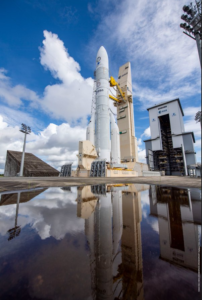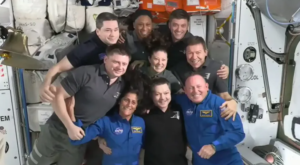What’s Happening in Space Policy July 7-13, 2024
Here is SpacePolicyOnline.com’s list of space policy events for the week of July 7-13, 2024 and any insight we can offer about them. The House and Senate are in session this week.
During the Week
It’s a busy week in the U.S. and abroad. Here in D.C., congressional committees will consider NASA, FAA and FCC authorizations and/or appropriations, and while we don’t have it on our Calendar, we’ll be keeping an eye on the NATO summit in case the importance of space assets comes up. Over in Japan, the 6th Summit for Space Sustainability takes place at the end of the week. This week’s headline-grabber, however, will be in French Guiana on the northeastern coast of South America where Europe will launch Ariane 6 for the first time.

Let’s start with Congress, which is trying to get a lot done this week. The 118th Congress’s legislative calendar is running out already. The House and Senate are in session this week, but will be out next week for the Republican National Convention. They return for two weeks through the first of August, then are out all of August, returning for three weeks in September. Then they are out for all of October through the November elections. That means between now and mid-November they are in session only for six weeks. The current schedule calls for them to be in session for five weeks after the elections. How much work they can get done in those weeks will depend on which party will control the House and Senate in the next Congress and, of course, the White House beginning January 20.

The House and Senate want to get as far as they can with FY2025 appropriations even if completing them before the end of the year seems quite unlikely. The House has passed four of the bills already, including Defense. Another is on the floor schedule this week.
The rest of the bills should be through full committee markup by Wednesday. The Commerce-Justice-Science (CJS) bill that funds NASA and NOAA is on the schedule for full committee markup on Tuesday and Transportation-HUD (THUD) including the FAA and its Office of Commercial Space Transportation on Wednesday. The House bills include highly partisan social policy provisions (“riders”) and those that passed did so on mostly party lines. That’ll complicate the rest of the appropriations process.
The Senate Appropriations Committee begins marking up its bills this week. None are space-related, though.

On the authorization front, the House Science, Space, and Technology Committee said late on Friday that they will mark up the NASA Reauthorization Act of 2024 on Wednesday. They indicated text would be circulated tomorrow (Monday).
Committee chair Rep. Frank Lucas (R-OK) said a year-and-a-half ago that passing a new NASA authorization act was a top priority. The clock is ticking. Whether they will try to pass it as a stand-alone bill or tack it onto “must pass” legislation like the National Defense Authorization Act remains to be seen. The NDAA has passed Congress every year since the first in 1961 so is often used as a vehicle for other bills, but the House passed its version already so the NASA bill would have to be added to the Senate version or during conference. The Senate hasn’t introduced a NASA authorization bill yet, though the chair and ranking member of the Senate Commerce Committee also have indicated it’s a priority. The NASA authorization is separate from commercial space legislation, which both sides also have said they want to pass this year.
The House Energy and Commerce Committee’s Subcommittee on Communications and Technology will hold an FCC oversight hearing this week, too. The FCC is not part of the Executive Branch like NASA, DOD and all the other familiar agencies. It reports directly to Congress so its oversight committees (House E&C and Senate Commerce) have even more influence. The FCC is getting more and more involved in space, but how much the hearing will focus on space is unclear.
As for the NATO Summit, we don’t have it on our Calendar because space activities may or may not figure in the discussions. They should, considering the vital role space assets play in meeting NATO’s mandate to “prevent war and keep peace,” so we’ll be keeping an eye on it. The United Kingdom’s new Prime Minister, Keir Starmer, is expected to be there. Labour defeated the Conservative (Tory) party in a landslide on Thursday, putting them in power for the first time in 14 years. Starmer’s only been on the job for a few days, but has headed the Labour Party since April 2020. [Sir Patrick Vallance is the new Minister of State (Minister for Science) in the Department of Science, Innovation and Technology.]
Over in Tokyo, the 6th Summit for Space Sustainability on Thursday and Friday Japanese time looks very interesting. There’s a virtual option (you need to register first), although the time zone difference is a challenge. The Summit begins Thursday at 9:30 am in Tokyo, which is Wednesday 8:30 pm Eastern Daylight Time. Sponsored by the Secure World Foundation and Japan’s Cabinet Office for Space Policy, the speaker’s list is a who’s who of the international space community working to ensure today’s users of Earth orbit don’t ruin it for future generations. In addition to many terrific panels like this one highlighted in an SWF post on X (@SWFoundation), there are fireside chats and keynotes.

Two sessions especially piqued our interest. One is a fireside chat on Thursday at 11:15 am local time (Wednesday, 10:15 pm EDT) with Richard DalBello from the Office of Space Commerce at the U.S. Department of Commerce and Paul Bate, CEO of the U.K. Space Agency, moderated by SWF’s Victoria Samson. The other is a keynote by NASA Deputy Administrator Pam Melroy on Friday at 9:30 am local time (Thursday, 8:30 pm EDT). The entire two-day event looks terrific.
Overseas in a completely different direction is Tuesday’s Ariane 6 launch from Europe’s Guiana Space Centre in Kourou, French Guiana. The launch window is open from 2:00-6:00 pm EDT (3:00-7:00 pm local time). ESA will provide live coverage. It’s hard to overstate how important it is for this launch to go well. Ariane 6 is four years late. New launch vehicles almost always take much longer to develop than expected, but in this case Ariane 6 took so long that Europe temporarily lost its cherished independent access to space. The final Ariane 5 launch was almost exactly one year ago and Europe’s smaller Vega C failed in December 2022 and still hasn’t returned to flight. ESA and the European Union have had to buy launches from a foreign supplier — SpaceX. ESA Director General Joseh Aschbacher calls the European launcher situation a “crisis.”
#Ariane6: on the launch pad and ready for liftoff ???? pic.twitter.com/6wQR4glW3N
— ESA Space Transport (@ESA_transport) June 28, 2024
Lots of other great events are on tap this week, but we will highlight just one more. On Wednesday, NASA astronauts Butch Wilmore and Suni Williams will hold an on-orbit news conference from the International Space Station about the status of their Crew Flight Test of Boeing’s Starliner spacecraft.

Butch and Suni launched to the ISS on June 5 for an 8-day stay, but are still there a month later. NASA and Boeing are being criticized for providing insufficient information about what’s going on. For example, NASA and Boeing said this version of Starliner could only stay docked for 45 days because of the lifetime of batteries on the Crew Module, but now the batteries don’t seem to be a limitation and there is no date for them to return.
As often happens when there’s a lack of information, speculation takes over. To the dismay of NASA and Boeing, stories abound about the crew being “stranded” in space. They stress again and again that Starliner is perfectly fine to bring the crew home in an emergency, but absent an emergency they’d like to keep it in orbit so they can do more tests to figure out why five Reaction Control Thrusters failed (four later resumed operation) and five helium leaks occurred in the Service Module. The Service Module doesn’t return to Earth so whatever tests they need to do with the Service Module have to be done while it’s at ISS. That makes sense, but the shifting story about how long Starliner can remain in orbit is a head scratcher. How much Butch and Suni will talk about any of that remains to be seen, but it’ll be good to hear directly from them.
Those and other events we know about as of Sunday morning are shown below. Check back throughout the week for others we learn about later and add to our Calendar or changes to these.
Monday, July 8
- Schriever Spacepower Series with Lt. Gen. David Miller, Commander, USSF Space Operations Command (Mitchell Inst), virtual, 10:00 am ET
Monday-Tuesday, July 8-9
- Space Weather Roundtable (National Academies), Keck Center, 500 5th St., NW, Washington, DC/virbutal
Monday-Wednesday, July 8-10 (Japan Standard Time)
- SPACETIDE 2024, Tokyo, Japan
Monday-Friday, July 8-12
- 8th International Conference on Mars Polar Science and Exploration (LPI), Whitehorse, Yukon, Canada
Tuesday, July 9
- House Appropriations Full Committee Markup FY2025 CJS Bill (and others), 2359 Rayburn House Office Building, 9:00 am ET (webcast)
- House Energy & Commerce Subcommitte Hearing on FCC’s FY2025 Budget, 2123 Rayburn House Office Building, 10:00 am ET (webcast)
- Ariane 6 Inaugural Launch, Kourou, French Guiana, 2:00-6:00 pm ET (3:00-7:00 pm local time), livestreamed beginning half an hour before launch
Wednesday, July 10
- House Appropriations Full Committee Markup FY2025 THUD bill (and others), 2359 Rayburn House Office Building, 10:00 am ET (webcast)
- House SS&T Full Committee Markup NASA Reauthorization Act of 2024, 2318 Rayburn House Office Building, 10:00 am ET (webcast)
- On-Orbit News Conference with NASA Astronauts Butch Wilmore and Suni Williams, Earth orbit, 11:00 am ET (NASA TV)
- Space Investors Forum (NSSA), Intelsat, Tysons Corner, VA, 2:00-7:00 pm ET (closed to the press)
Thursday, July 11
- Report Release: Mid-Term Assessment of Earth Science Decadal Survey (National Academies), virtual, 3:00-4:00 pm ET
Thursday-Friday, July 11-12
- 6th Summit on Space Sustainability (Secure World Foundation/Japan Cabinet Office for Space Policy), Tokyo, Japan [Thursday-Friday Japan Standard Time/Wednesday pm -Friday am EDT]
- NASA Small Bodies Assessment Group (SBAG), virtual
Friday, July 12
- Departure of NG-20 Cygnus Cargo Vehicle from ISS, Earth orbit, 7:00 am ET (NASA coverage begins 6:00 am ET)
Saturday, July 13 – Sunday, July 21
- COSPAR 2024: 45th Scientific Assembly, Busan, South Korea
This article has been updated.
User Comments
SpacePolicyOnline.com has the right (but not the obligation) to monitor the comments and to remove any materials it deems inappropriate. We do not post comments that include links to other websites since we have no control over that content nor can we verify the security of such links.